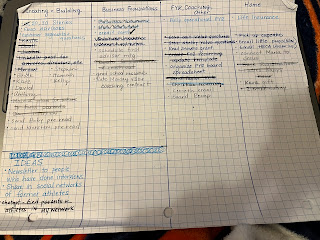Why I Set Objectives Instead of Resolutions
In 2018, I read 7 Habits of Highly Effective People for the first time. Actually, I listened to it then promptly bought the physical copy and read it cover to cover. Studied it. It’s dense content that had many times before been recommended to me, but for some reason, that summer, it just all sunk in.
The book is divided into three primary goals with the note that you must master them in order:
- Personal Victory – Mastery and discipline over oneself
- Public Victory – Establishing deep relationships of high integrity
- Sharpening the Sword – Continuous evolution and improvement
The author, Stephen Covey, encourages you to imagine yourself at the end of your life – maybe your celebration of life; maybe your 100th birthday – and to visualize who want in the room and what you hope they would say. For me, this is the perfect North Star for the way I want to define success and a life well lived.
With this vision in place, every year for the last six years, I’ve created personal objectives for the year. I wouldn’t call them goals or resolutions. Most of the things on my list aren’t particularly exciting or ambitious. They’re small, daily behaviors—things that can easily get lost in the shuffle of bigger milestones
It’s fun to look back and see how these objectives have evolved. When I first started in 2019, they were heavily focused on personal mastery, and that remained true for most of the past six years. But this year, for the first time, I feel like my focus is expanding. I’m drawn toward connection—how I can create and deepen lasting relationships rather than just focusing inward.
I know everyone has their own January process for planning the year ahead, but I love how this practice keeps me grounded. It’s a way to focus on who I’m becoming rather than just what I’m achieving. It keeps me aligned with my undistracted definition of success—one that isn’t dictated by outside expectations but by the future I envision for myself.
.jpeg)
.jpeg)
.jpeg)


Comments
Post a Comment